Hyundai i10 vs Subaru Outback – Differences & prices compared
Compare performance, boot space, consumption and price in one view.
Find out now: which car is the better choice for you – Hyundai i10 or Subaru Outback?
The Hyundai i10 (Hatchback) comes with a Petrol engine and Manuel or Automatic transmission. In comparison, the Subaru Outback (Estate) features a Petrol engine with Automatic transmission.
When it comes to boot capacity, the Hyundai i10 offers 252 L, while the Subaru Outback provides 561 L – depending on how much space you need. If you’re looking for more power, decide whether the 90 HP of the Hyundai i10 or the 169 HP of the Subaru Outback suits your needs better.
In terms of consumption, the values are 4.90 L per 100 km for the Hyundai i10, and 8.60 L for the Subaru Outback.
Price-wise, the Hyundai i10 starts at 14600 £, while the Subaru Outback is available from 37200 £. Compare all the details and find out which model fits your lifestyle best!
Hyundai i10
The Hyundai i10 impresses with its compact design, making it an ideal choice for navigating through busy urban environments. Its interior is surprisingly spacious, offering drivers and passengers comfort beyond what one might expect from a city car. The model combines efficiency and practicality, making it an attractive option for those seeking both economy and functionality in their daily commute.
details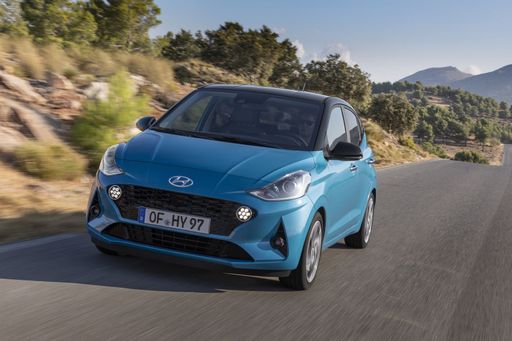 @ hyundai.news
@ hyundai.news
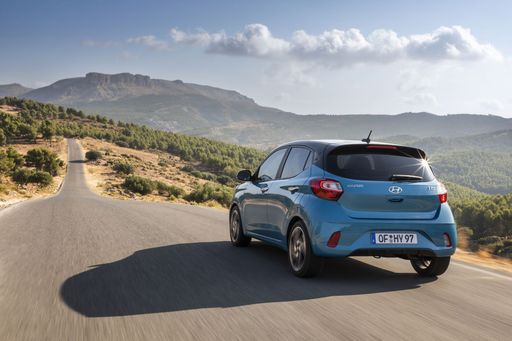 @ hyundai.news
@ hyundai.news
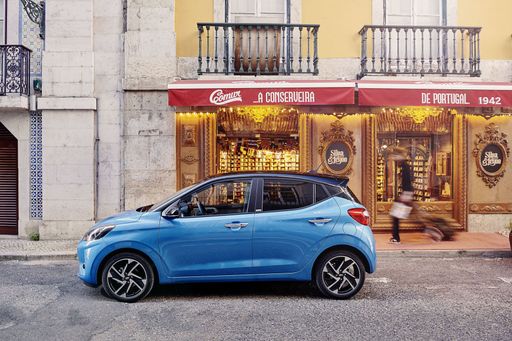 @ hyundai.news
@ hyundai.news
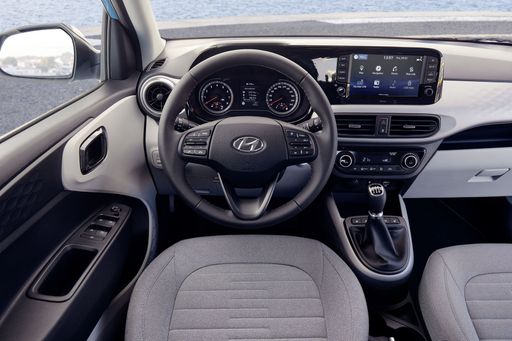 @ hyundai.news
@ hyundai.news
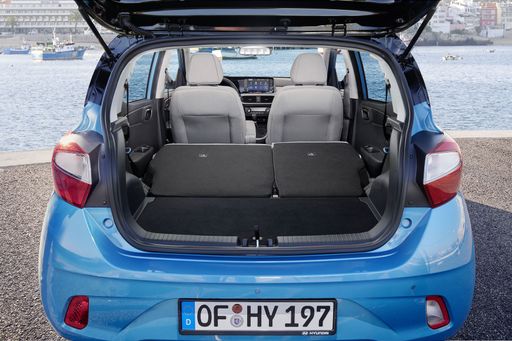 @ hyundai.news
@ hyundai.news
Subaru Outback
The Subaru Outback offers a perfect blend of rugged capability and modern comfort, making it an ideal choice for those who love adventure without compromising on convenience. Its robust design is complemented by advanced safety features and a spacious interior, ensuring a relaxed and secure driving experience. With a reputation for reliability and versatility, the Outback continues to stand out in its class, appealing to drivers who appreciate both performance and practicality.
details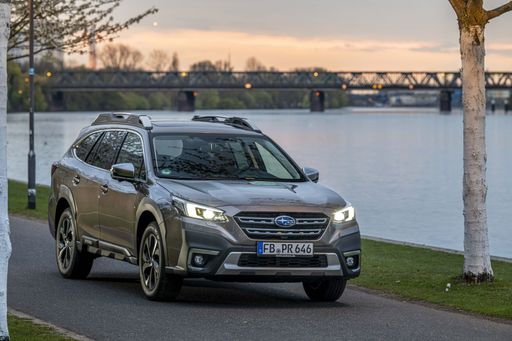 @ Subaru
@ Subaru

|

|
|
|
|
Costs and Consumption |
|
|---|---|
|
Price
14600 - 19000 £
|
Price
37200 - 41600 £
|
|
Consumption L/100km
4.9 - 5.5 L
|
Consumption L/100km
8.60 L
|
|
Consumption kWh/100km
-
|
Consumption kWh/100km
-
|
|
Electric Range
-
|
Electric Range
-
|
|
Battery Capacity
-
|
Battery Capacity
-
|
|
co2
110 - 124 g/km
|
co2
193 g/km
|
|
Fuel tank capacity
36 L
|
Fuel tank capacity
63 L
|
Dimensions and Body |
|
|---|---|
|
Body Type
Hatchback
|
Body Type
Estate
|
|
Seats
4 - 5
|
Seats
5
|
|
Doors
5
|
Doors
5
|
|
Curb weight
996 - 1099 kg
|
Curb weight
1643 - 1676 kg
|
|
Trunk capacity
252 L
|
Trunk capacity
561 L
|
|
Length
3670 - 3675 mm
|
Length
4870 mm
|
|
Width
1680 mm
|
Width
1875 mm
|
|
Height
1480 - 1483 mm
|
Height
1670 - 1675 mm
|
|
Payload
344 - 423 kg
|
Payload
524 - 557 kg
|
Engine and Performance |
|
|---|---|
|
Engine Type
Petrol
|
Engine Type
Petrol
|
|
Transmission
Manuel, Automatic
|
Transmission
Automatic
|
|
Transmission Detail
Schaltgetriebe, Automatisiertes Schaltgetriebe
|
Transmission Detail
-
|
|
Drive Type
Front-Wheel Drive
|
Drive Type
All-Wheel Drive
|
|
Power HP
63 - 90 HP
|
Power HP
169 HP
|
|
Acceleration 0-100km/h
11.4 - 18.4 s
|
Acceleration 0-100km/h
10.20 s
|
|
Max Speed
143 - 175 km/h
|
Max Speed
193 km/h
|
|
Torque
93 - 172 Nm
|
Torque
252 Nm
|
|
Number of Cylinders
3 - 4
|
Number of Cylinders
4
|
|
Power kW
46 - 66 kW
|
Power kW
124 kW
|
|
Engine capacity
998 - 1197 cm3
|
Engine capacity
2498 cm3
|
General |
|
|---|---|
|
Model Year
2024
|
Model Year
2024
|
|
CO2 Efficiency Class
C, D
|
CO2 Efficiency Class
G
|
|
Brand
Hyundai
|
Brand
Subaru
|
Hyundai i10
Introduction to the Hyundai i10
The Hyundai i10 has consistently proven to be a dependable and stylish companion for urban driving. Known for its compact design and efficiency, this hatchback offers a perfect blend of modern aesthetics and practicality, making it a popular choice for city dwellers and small families alike.
Performance and Efficiency
The Hyundai i10 is available with both manual and automatic transmissions, catering to various driving preferences. Engine power ranges from 63 to 90 PS, providing a versatile driving experience for both novice and seasoned drivers. The fuel consumption varies between an impressive 4.9 to 5.4 litres per 100 kilometres, fitting for those looking to minimise fuel costs while also reducing their carbon footprint.
Engine and Transmission
Equipped with a choice of 1.0-litre or 1.2-litre engines, the i10 offers up to 172 Nm of torque, ensuring lively performance. The models feature front-wheel-drive configurations, allowing for smooth handling and reliable road performance. The car excels in city driving but is equally capable on longer journeys.
Interior and Comfort
Despite its compact size, the Hyundai i10 does not compromise on interior space and comfort. It accommodates four to five occupants comfortably, offering sufficient legroom and headroom. Its flexible seating arrangement and a 252-litre boot make it ideal for both quick trips and weekend getaways.
Safety and Technology
Safety remains a priority with Hyundai, and the i10 is no exception. It comes equipped with multiple airbags, stability control, and advanced braking systems. Technology-wise, the i10 features a user-friendly infotainment system with smartphone connectivity, ensuring a pleasant and connected drive.
Design and Style
The Hyundai i10’s design is both modern and sleek, making it stand out in the compact hatchback segment. With a length ranging from 3670 to 3675 mm, a width of 1680 mm, and a height of 1480 to 1483 mm, the i10 strikes a perfect balance between style and functionality.
Affordable Pricing and Value
The i10 is available in several trims including the Select, N Line, and Prime, among others, with prices ranging from €16,990 to €22,190. Considering its features and low running costs — with monthly expenses estimated between €694 to €793 — the Hyundai i10 offers substantial value for those seeking an economical yet stylish hatchback.
Conclusion
The Hyundai i10 combines efficiency, modern design, and practicality in a compact package. Whether you are seeking a reliable city car or an economical daily driver, the Hyundai i10 is a strong contender worth considering in the compact car market of 2024.
Subaru Outback
A Perfect Blend of Comfort and Capability: The Subaru Outback
For those who are looking for a car that skillfully combines rugged capability with luxurious comfort, the Subaru Outback has been a go-to choice. As a pioneer in the crossover SUV segment, this vehicle has continually impressed drivers with its unique blend of practicality and innovation. Let's dive into the details of what makes the Subaru Outback a standout choice in its class.
Dynamic Performance and Engine Details
Under the bonnet, the Subaru Outback is powered by a 2.5-litre Boxer engine, renowned for its balance and smooth operation. Delivering a robust 169 PS, the engine provides ample power for adventurous drives. With a torque of 252 Nm, it offers a responsive driving experience, especially when coupled with its CVT (Continuously Variable Transmission) gearbox.
All-Wheel Drive Mastery
A defining feature of the Subaru Outback is its full-time all-wheel-drive system, designed to enhance stability and grip, regardless of road conditions. Whether you're navigating twisting mountain roads or venturing off the beaten path, the Outback offers reassuring traction and control.
Efficiency and Environmental Considerations
Efficiency has not taken a back seat in the Subaru Outback. With a fuel consumption of 8.6 L/100 km, it strikes a good balance between performance and economy. However, it's worth noting that the vehicle's CO2 efficiency class is rated at G, reflecting its larger engine size and capability.
Spacious and Versatile Interior
The interior of the Subaru Outback is designed with passenger comfort and cargo versatility in mind. With seating for five, the spacious cabin is both practical and refined. Additionally, the boot space of 561 litres provides ample room for luggage and gear, making it an excellent choice for family outings and adventures.
Safety and Technology Innovations
The Subaru Outback is equipped with advanced safety technologies aimed at providing peace of mind on every journey. This includes Subaru's renowned EyeSight Driver Assist Technology, which features adaptive cruise control, pre-collision braking, and lane-keeping assist. These systems work together to help prevent accidents and enhance overall driving safety.
Conclusion
In summary, the Subaru Outback offers a comprehensive package of performance, comfort, and safety. Its ability to seamlessly transition from urban environments to rugged landscapes exemplifies its versatility. Whether you're seeking adventure or simply a reliable vehicle for daily use, the Subaru Outback has much to offer. With a price range of €43,440 to €48,840, it presents a compelling option for those who value quality and robustness in a crossover SUV.
The prices and data displayed are estimates based on German list prices and may vary by country. This information is not legally binding.
